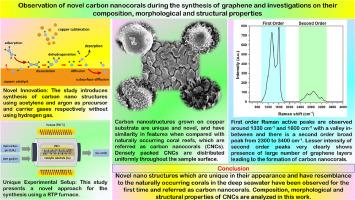Observation of novel carbon nanocorals during the synthesis of graphene and investigations on their composition, morphological and structural properties
IF 3.1
Q2 MATERIALS SCIENCE, MULTIDISCIPLINARY
引用次数: 0
Abstract
Novel carbon nanocorals (CNCs) are observed during the synthesis of graphene on copper substrates by thermal chemical vapor deposition, using precursor gas acetylene (C2H2) and carrier gas argon (Ar). CNCs have unique structure and investigations are carried out on structural and elemental compositions by X-ray diffraction (XRD), Raman spectroscopy, X-ray photoelectron spectroscopy (XPS), X-ray excited Auger electron spectroscopy (XAES), energy dispersive X-ray spectroscopy (EDS), field emission scanning electron microscopy (FESEM), and high resolution transmission electron microscopy (HRTEM). The graphitic nature of the CNCs is evident from characteristic D, G, and 2D bands obtained from Raman spectrum. Elemental composition analysis by XPS shows presence of sp2 and sp3 hybridized carbon whereas XAES quantifies percentage of sp2 and sp3 hybridized carbon. FESEM micrographs show a uniform distribution of densely packed CNCs throughout the sample, and formation of groups of CNCs with distinct contours on the surface. The cross-sectional FESEM shows stacking of large number of graphene layers with dendrites. HRTEM analysis further supports observations of FESEM and elaborates structural morphology of the CNCs. Synthesis, characterization and analysis of the properties of carbon nanocorals are reported here, for the first time.

在合成石墨烯过程中观察新型碳纳米珊瑚并研究其组成、形态和结构特性
使用前驱气体乙炔(C2H2)和载气氩气(Ar),通过热化学气相沉积法在铜基底上合成石墨烯时,观察到了新型碳纳米珊瑚(CNCs)。CNC 具有独特的结构,研究人员通过 X 射线衍射 (XRD)、拉曼光谱、X 射线光电子能谱 (XPS)、X 射线激发欧杰电子能谱 (XAES)、能量色散 X 射线能谱 (EDS)、场发射扫描电子显微镜 (FESEM) 和高分辨率透射电子显微镜 (HRTEM) 对其结构和元素组成进行了研究。从拉曼光谱中获得的 D、G 和 2D 带特征可以看出 CNC 的石墨性质。XPS 元素组成分析表明存在 sp2 和 sp3 杂化碳,而 XAES 则量化了 sp2 和 sp3 杂化碳的百分比。FESEM 显微照片显示整个样品均匀分布着密集的 CNC,并在表面形成具有明显轮廓的 CNC 群。横截面的 FESEM 显示了大量石墨烯层与树枝状石墨烯层的堆叠。HRTEM 分析进一步支持了 FESEM 的观察结果,并详细说明了 CNC 的结构形态。本文首次报道了碳纳米陶瓷的合成、表征和性质分析。
本文章由计算机程序翻译,如有差异,请以英文原文为准。
求助全文
约1分钟内获得全文
求助全文
来源期刊

Carbon Trends
Materials Science-Materials Science (miscellaneous)
CiteScore
4.60
自引率
0.00%
发文量
88
审稿时长
77 days
 求助内容:
求助内容: 应助结果提醒方式:
应助结果提醒方式:


